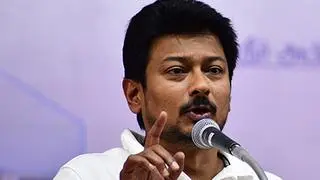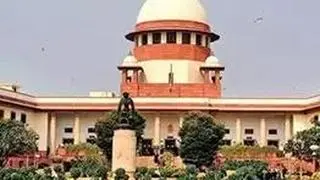In all the elections held since the death of MG Ramachandran, Tamil Nadu Chief Minister, actor-turned-politician and founder of the AIADMK, in 1987, the AIADMK and DMK have alternately been voted to power.
That is, neither party has managed to get re-elected for a second consecutive term.
The leaders of the two parties have been the same — J Jayalalithaa, the present Chief Minister, for the AIADMK, and the nonagenarian M Karunanidhi of the DMK.
Will Jayalalithaa be able to break this trend?
Looks like it if you go by what most political analysts have predicted. Their reasoning is quite simple: there is no pronounced and visible anti-incumbency and, more importantly, the opposition votes are not getting consolidated this time as has happened in the past.
This time it will be a five-cornered contest — the AIADMK with a handful of small parties; the DMK-Congress and a few small parties; the People’s Welfare Front consisting of Vijayakant’s DMDK, Vaiko’s MDMK, GK Vasan’s TMC, CPI(M), CPI and Vidhuthalai Chiruthaigal; the PMK which has projected Anbumani Ramadoss, former Union Health Minister and son of the party’s founder S Ramadoss, as its CM candidate; and, the BJP.
Realignment of forcesThere has been a realignment of forces too, since the 2011 elections when Jayalalithaa stormed to power for a third time, relegating the DMK to third place in the Assembly and decimating the Congress to single digits.
In the last elections the AIADMK front consisted of DMDK, the two communist parties, Puthiya Tamilagam, Forward Bloc and Manithaneya Makkal Katchi, while the DMK front included the Congress, PMK and VCK.
The AIADMK front got nearly 52 per cent of the votes polled, with the AIADMK winning 150 of the 165 seats it contested with a 38.4 per cent vote share and the DMDK, which got the second highest number of seats, winning in 29 of the 41 seats it had candidates in and getting 7.8 per cent of the votes polled.
It was this vote share of the DMDK that prompted others, especially the DMK and the BJP, to actively woo Vijayakant.
The DMDK was actually part of the NDA in the 2014 general elections, which also included the PMK. The NDA more or less collapsed in the State after the elections.
Keen duelBoth Jayalalithaa and Karunanidhi have avoided reacting to barbs from leaders of the other fronts or criticising the other parties. Instead, they have trained their guns on each other, proving yet again that this is a fight between the AIADMK and the DMK, and the other players, whatever the chances they fancy, are not in contention for the top post.
Jayalalithaa can sit pretty also because of the number of freebies and subsidised schemes she has announced and implemented over the past five years, many of them under the “Amma” brand. Announcing freebies to woo the voters was what the DMK employed in the 2006 elections, but its arch-rival took it to a different level.
It does not, however, appear to be smooth sailing for Jayalalithaa and the AIADMK. One, the rumours about her health refuse to subside. This is all the more important since she is the only star campaigner for her party, while the DMK can boast of a well-oiled machinery. Party treasurer and Karunanidhi’s son, MK Stalin, has taken it upon himself to be the main campaigner for the party, criss-crossing the State.
A few weeks short of 92 years, Karunanidhi appears in no mood to call it a day and he will be filing his nomination from Tiruvarur constituency, from where he was elected in 2011, too.
There are rumblings within the AIADMK over seat allocation and the reported sidelining of seniors like O Panneerselvam, who was Chief Minister when Jayalalithaa had to step down, and Natham Viswanathan. Some prominent candidates have even openly complained that they are not getting the support of the local leaders.
Hidden angerIs there a change in public mood these past few days? Some seem to think so, but are not sure if it is enough to tilt the results.
Is there an anti-incumbency and a hidden anger against the AIADMK because of the mess after the December rains?
For answers to both these, we will have to wait for May 19, when counting for the elections to the five Assemblies will be taken up.








Comments
Comments have to be in English, and in full sentences. They cannot be abusive or personal. Please abide by our community guidelines for posting your comments.
We have migrated to a new commenting platform. If you are already a registered user of TheHindu Businessline and logged in, you may continue to engage with our articles. If you do not have an account please register and login to post comments. Users can access their older comments by logging into their accounts on Vuukle.